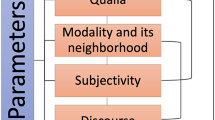Abstract
This paper is concerned with the question of quantifying gradient degrees of acceptability by introducing the notion of Density in the context of constructional constraint language processing. We first present here our framework for language processing, where all linguistic knowledge is represented by means of constraints. The grammar itself is a constraint system. A constraint is a relation among categories, which encodes a linguistic property. But in contrast to more traditional constraint-based approaches, a constraint can hold and be assessed independently from the structure. In this context, we then introduce the notion of density, based on proportions of satisfied and violated linguistic properties. Our intuition is that density can be used as a means to measure fuzzy notions such as syntactic complexity or as a criterion to identify gradient levels of acceptability. We present and discuss early experimental results concerning density.
Preview
Unable to display preview. Download preview PDF.
Similar content being viewed by others
References
Gibson, E.: The Dependency Locality Theory: A Distance-Based Theory of Linguistic Complexity. In: Marantz, A., Miyashita, Y., ONeil, W. (eds.) Image, Language, Brain, pp. 95–126. MIT Press, Cambridge (2000)
Bolinger, D.: Generality, Gradience and the All–or–None, Mouton. The Hague (1961)
Aarts, B.: Modelling Linguistic Gradience. Studies in Language 28, 1–49 (2004)
Bresnan, J., Nikitina, T.: On the Gradience of the Dative Alternation. Draft (2003)
Keller, F.: Gradience in Grammar - Experimental and Computational Aspects of Degrees of Grammaticality. PhD thesis, University of Edinburgh (2000)
Sorace, A., Keller, F.: Gradience in Linguistic Data. Lingua (2004) (in press)
Prince, A., Smolensky, P.: Optimality Theory: Constraint Interaction in Generatire Grammar. Technical report, TR-2, Rutgers University Cognitive Science Center, New Brunswick, NJ (1993)
Pullum, G., Scholz, B.: On the Distinction Between Model-Theoretic and Generative-Enumerative Syntactic Frameworks. In: de Groote, P., Morrill, G., Retoré, C. (eds.) LACL 2001. LNCS (LNAI), vol. 2099, pp. 17–43. Springer, Heidelberg (2001)
Fillmore, C.: Inversion and Constructional Inheritance. In: Lexical and Constructional Aspects of Linguistic Explanation. Stanford University, Stanford (1998)
Goldberg, A.: Constructions: A Construction Grammar Approach to Argument Structure. Chicago University Press, Chicago (1995)
Keller, F.: A Probabilistic Parser as a Model of Global Processing Difficulty. In: Proceedings of ACCSS 2003 (2003)
Kay, P., Fillmore, C.: Grammatical Constructions and Linguistic Generalizations: the what’s x doing y? Construction. Language (1999)
Blache, P.: Constraints, Linguistic Theories and Natural Language Processing. In: Christodoulakis, D.N. (ed.) NLP 2000. LNCS (LNAI), vol. 1835, p. 221. Springer, Heidelberg (2000)
Mertens, P.: Accentuation, intonation et morphosyntaxe. Travaux de Linguistique 26 (1993)
Sag, I., Wasow, T.: Syntactic Theory. A Formal Introduction. CSLI (1999)
Maruyama, H.: Structural Disambiguation with Constraint Propagation. In: Proceedings 28th Annual Meeting of the ACL, Pittburgh, PA, pp. 31–38 (1990)
Duchier, D.: Axiomatizing Dependency Parsing Using Set Parsing. In: Proceedings 6th Meeting on the Mathematics of Language, Orlando, FL (1999)
Heinecke, J., Kunze, J., Menzel, W., Shröder, I.: Eliminative Parsing with Graded Constraints. In: Proceedings 7th International Conference on Computational Linguistics, 36th Annual Meeting of the ACL, Montreal, Canada. Coling–ACL 1998, pp. 526–530 (1998)
Christiansen, H.: CHR Grammars. Theory and Practice of Logic Programming. Special issue on Constraint Handling Rules (2005) (to appear)
Frühwirth, T.: Constraint Handling Rules. In: Podelski, A. (ed.) Constraint Programming: Basics and Trends. LNCS, vol. 910. Springer, Heidelberg (1995)
Blache, P.: Les Grammaires de Propriétés: des contraintes pour le traitement automatique des langues naturelles. Hermès Sciences (2001)
Author information
Authors and Affiliations
Editor information
Editors and Affiliations
Rights and permissions
Copyright information
© 2005 Springer-Verlag Berlin Heidelberg
About this paper
Cite this paper
Blache, P., Prost, JP. (2005). Gradience, Constructions and Constraint Systems. In: Christiansen, H., Skadhauge, P.R., Villadsen, J. (eds) Constraint Solving and Language Processing. CSLP 2004. Lecture Notes in Computer Science(), vol 3438. Springer, Berlin, Heidelberg. https://doi.org/10.1007/11424574_5
Download citation
DOI: https://doi.org/10.1007/11424574_5
Publisher Name: Springer, Berlin, Heidelberg
Print ISBN: 978-3-540-26165-0
Online ISBN: 978-3-540-31928-3
eBook Packages: Computer ScienceComputer Science (R0)




